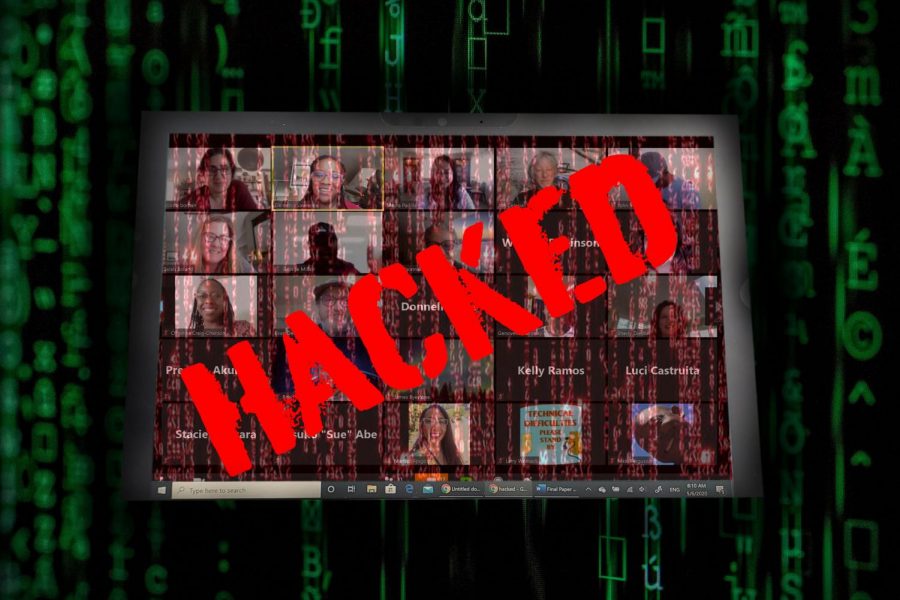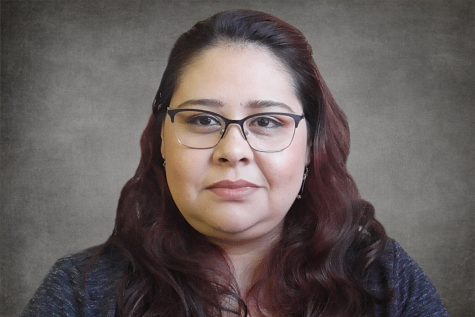Town Hall meeting hacked with child pornography
A group of over 50 students and community members gathered Monday in a virtual Town Hall Meeting to receive the latest campus updates. The meeting was hacked by an unknown individual.
May 6, 2020
The Contra Costa College community was shocked to its core after hackers streamed pornographic images involving a young child during a public Zoom meeting on Monday.
A group of over 50 students and community members gathered Monday in a virtual Town Hall Meeting to receive the latest campus updates.
Administrators shared information with a slide presentation, however 30 minutes into the meeting, the presentation was interrupted and replaced with a pornographic video of a girl being sexually assaulted.
Marketing Director Larry Womack said he was acting as a co-host of the meeting. During the Q&A portion of the call, he lost control of the meeting as the disturbing video suddenly showed up and started playing on the screen.
“I was sharing my screen with the slide presentation, and then, suddenly, some music started playing on the slide. While that was going on, my screen went black. I wasn’t able to see anything, but I could hear the baby crying.”
Womack said Student Life Coordinator Charles Ramirez was the host of the meeting. As soon as the video filled the screen, he was able to ban the user from the meeting, but then a graphic still image came right back with the hacker using a different username.
Ramirez quickly ended the meeting.
“I believe this was a hack because I have never had anything like that happen before. We notified (Police Services) immediately,” Womack said. “The District Office looked at the Internet Provider Security (IPS) of participants, and they found two suspicious addresses that were located in Germany. Keep in mind that they could be using someone else’s VPN.”
Interim Chancellor Eugene Huff said the Contra Costa Community College District reported this incident to Police Services, the FBI and other local law enforcement.
“We are aware that there has been some of this similar activity going on in the area with the K-12 districts. This is not only happened to us. Zoom-bombing is happening nationwide,” Huff said. “We are cooperating with authorities as much as possible, and we are trying to identify the perpetrators.”
Huff said the district invested in new software and now is requiring people to use passwords in the broad meetings, in addition to other security options to prevent people other than the host and the co-host from accessing shared screens.
“We bought more Zoom webinar licenses so every location would have at least one license and we will use those for the larger public meetings from now on,” he said. “The webinars add more safety measures where people are not able to see each other, and they can only use the chat.”
Health and human services department Chairperson Aminta Mickles said she has seen a staggering number of students who were triggered by the incident and now are presenting symptoms of stress such as insomnia, stomachaches and headaches.
“Each class has shared what happened with others, and those who did not see (the video) with their own eyes, saw from a different lens and ultimately, they all saw it,” Mickles said.
Since instruction for the summer semester is expected to remain remote, students want the district to be proactive about avoiding cyber security issues like this one.
Current Associated Student Union Vice President Alfredo Angulo, who attended the virtual Town Hall Meeting, said students are not willing to sit and wait for another incident to happen.
“We need to be looking at these hacks, which are common, and we need to find ways to avoid them, even if it costs us more money. If the district decides not to invest in the features that add such security, then it’s just a ticking time bomb before this happens again to another group of people,” Angulo said.
“I’d encourage those who were present to reach out to the college’s mental health services if they need it,” he said. “That image was extremely graphic, and it can leave a lot of students with some trauma. The ASU is here for students; we apologize to everyone who had to go through that, and we hope that we can still have the ability to address the questions students have.
“If students have any questions or concerns, they can always reach out to us at asu@contracosta.edu,” he said.
CCC students in need of help to address emotional issues are encouraged to contact the wellness program and speak with a counselor at 510-215-3935 or email them at wellness@contracosta.edu.



